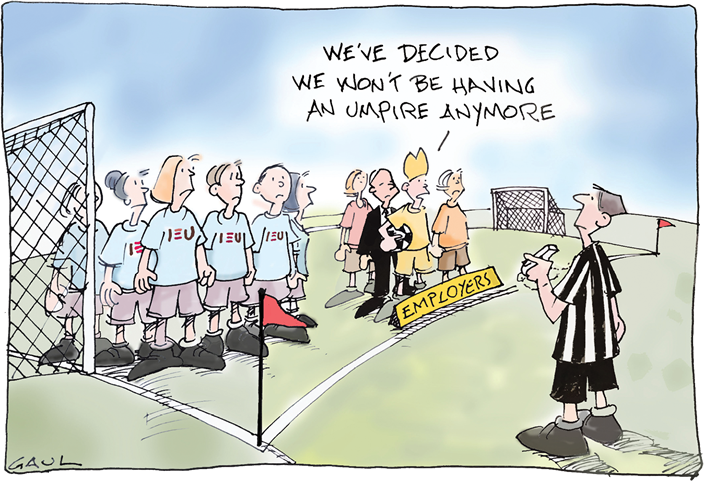
Negotiations between the IEU and the Catholic Commission for Employment Relations (CCER) for a new NSW/ACT Catholic Systemic Schools Enterprise Agreement (EA) have reached an impasse over the right to arbitration in the Dispute Procedures clause in the EA. At the core of the matter is the Catholic employers’ attempt to remove the right of arbitration to resolve industrial disputes thereby making the EA much harder to enforce and the Work Practices Agreements (WPAs) impossible to legally uphold.
This issue is of great importance to the Union as this right provides protection of the working conditions of teachers and support staff. The Union is calling on members across the Catholic systemic sector to take a stand against the Catholic employers’ position. It is anticipated that this will involve industrial action if the matter remains unresolved.
Background
The IEU has had a right of arbitration to resolve disputes for many years. Historically we could refer any dispute to the Industrial Relations Commission (IRC). Following conciliation, the IRC could arbitrate the dispute.
In the transition to the federal system in 2010 and in subsequent negotiations since then, the Catholic employers agreed with the Union that disputes about the content of an EA or WPAs could be resolved, that is arbitrated, by the Fair Work Commission (FWC).
The capacity to resolve WPAs by arbitration is of particular importance. Dealing with escalating workloads has been a major element of the IEU claim for teachers. The Union sought to embed working conditions in the EA. Only the Dioceses of Canberra/Goulburn and Wollongong have agreed to include the WPAs as annexures to the EA. In the case of the other dioceses the Union needs to rely on the right to arbitration as there are no other legal means of enforcement. For many months the Union has been negotiating for significant improvements in working conditions diocese by diocese and we do not want to see these outcomes diminished.
Despite the agreed intention of the Dispute Procedure clause in the current EA, Catholic employers now hold the view that there is no right to arbitration under the clause unless the employer agrees. The Union has sought to remove any ambiguity in the clause about the right to arbitration.
CCER maintains that arbitrations are few and therefore the right is unnecessary. It is our experience, however, that where this right does not exist, FWC recommendations during the conciliation process can be (and are) ignored by employers. The right to arbitration greatly strengthens conciliation in resolving disputes, hence the small number of arbitrated matters.
The CCER also claims that the right to arbitration will suddenly lead to a flood of litigation on the part of the Union against the Catholic employers before the FWC, but the opposite applies. Without the right to arbitration the Union can only take EA breaches to the Federal Circuit Court. This is a litigious process and therefore quite cumbersome with significant time demands and expense for both parties. Arbitration before the FWC is not litigation – no damages, penalty orders or pay order can be made and the parties do not need to be legally represented. It is unreasonable for the employers to reject such a process.
It is the view of the Union that the right to arbitration should not be optional under the Fair Work Act. The Union movement will step up its campaign prior to the next election for improvement to the Fair Work Act and we anticipate that this should include an automatic right to arbitration to resolve relevant disputes and more reasonable access for workers to take protected industrial action. Such a result would strengthen our agreements in all sectors including early learning and independent schools.
In the case of the Catholic Systemic EA the IEU seeks the support of members to fight to hold on to this right.







































































































































